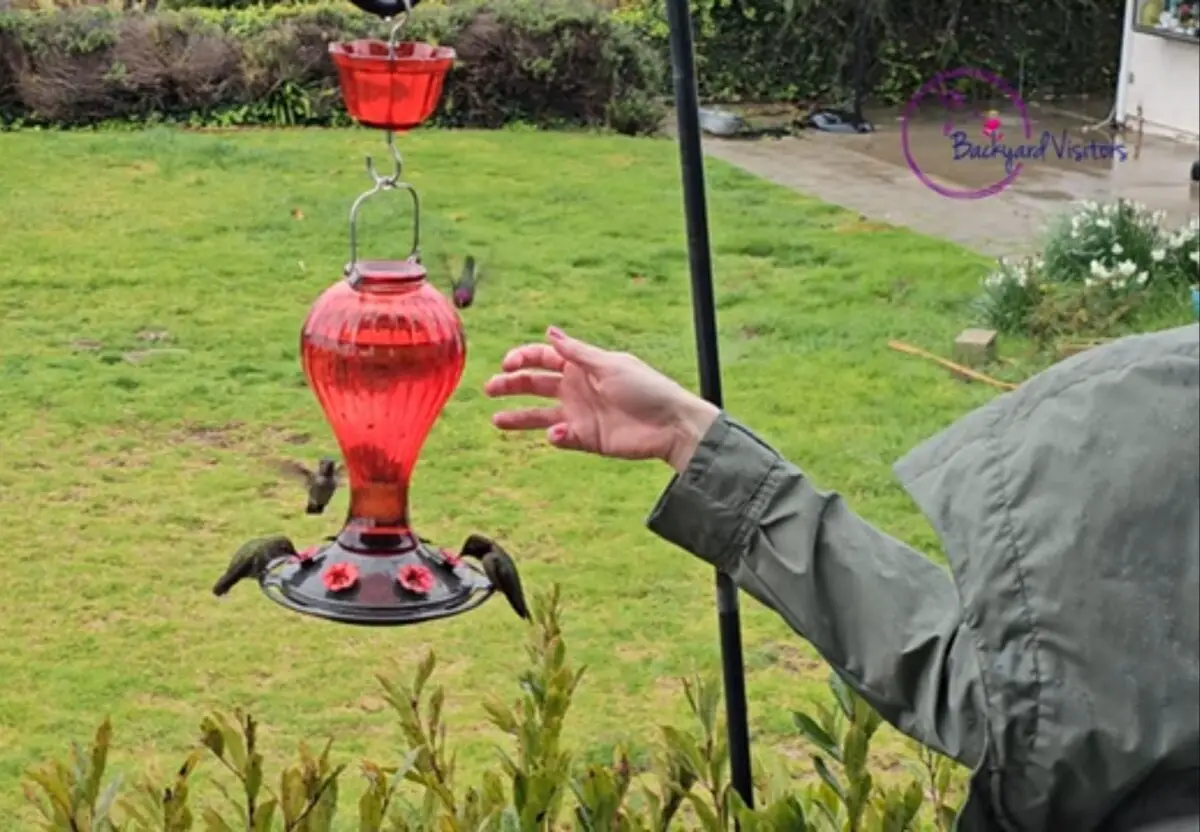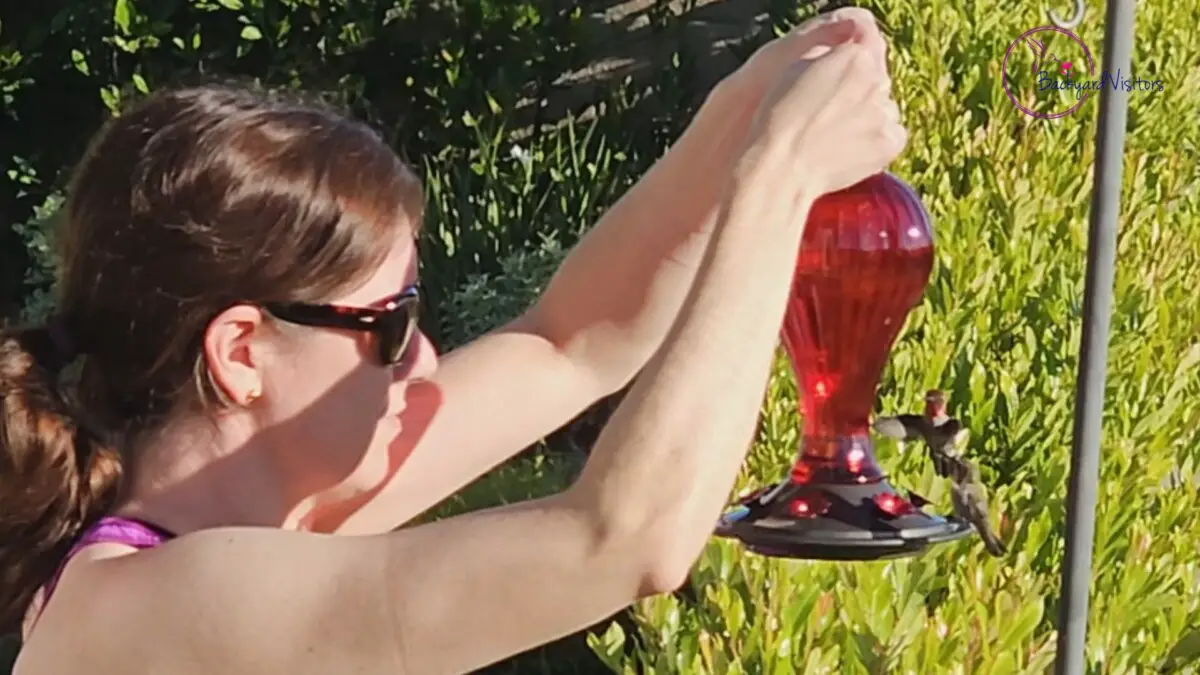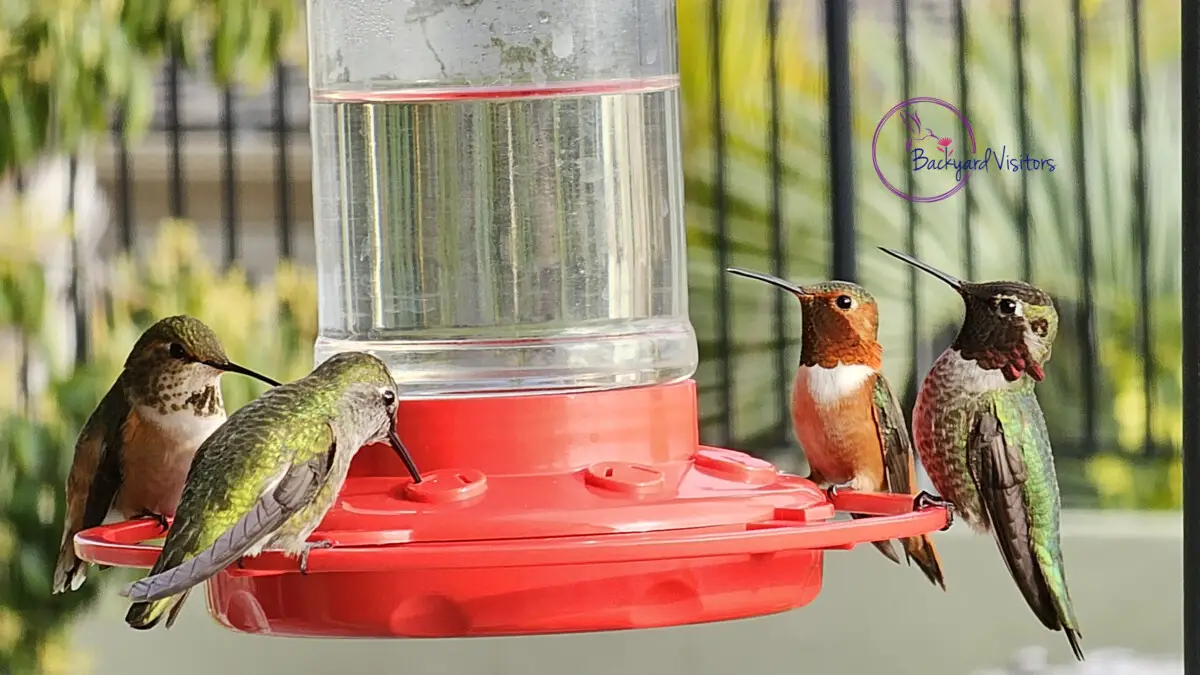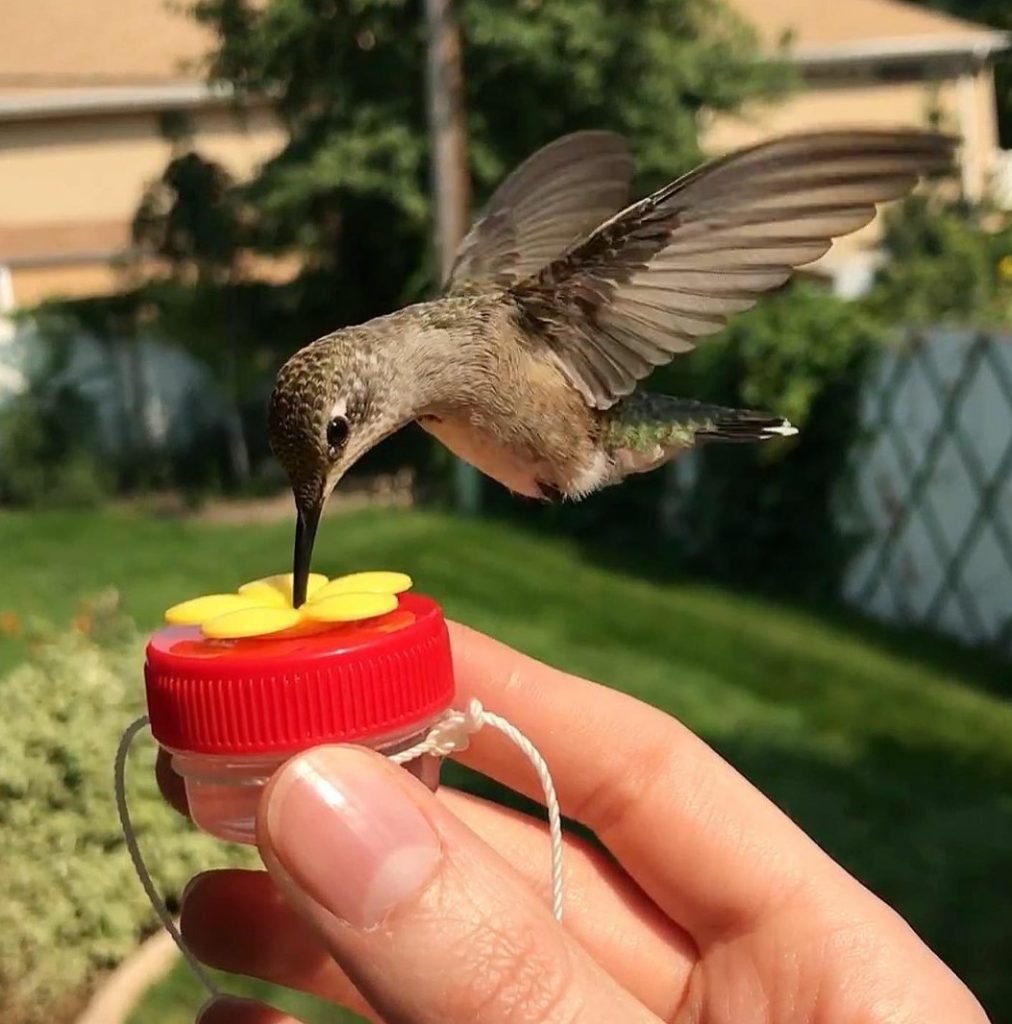This post contains affiliate links.
Welcome to the delicate dance between hummingbirds and humans, a relationship filled with fluttering wings and mutual intrigue. In this exploration of avian affection, I delve into the enchanting world of hummingbirds to discover whether these iridescent jewels of the sky recognize and bond with us.
As we unravel the mysteries of cross-species connection, prepare to be captivated by the possibility of forming an exclusive camaraderie with one of nature’s most mesmerizing creatures. Join me as I decode the signs and behaviors that a hummingbird remembers and interacts with its human admirers.
Do Hummingbirds Bond with People: Understanding Their Relationship with Humans
Many enthusiasts often wonder, do hummingbirds bond with people? These mesmerizing creatures, known for their iridescent feathers and rapid wing beats, exist in their own diminutive yet dynamic world. Despite their seemingly aloof nature, research and anecdotal evidence suggest that hummingbirds have the capacity to recognize and interact with humans.
Observations from avid birdwatchers reveal that hummingbirds become accustomed to people who regularly maintain hummingbird feeders in their gardens. This behavior indicates that hummingbirds remember those familiar humans who consistently provide them with nourishing nectar.

The interactions that some individuals experience with hummingbirds suggest that these birds do not fear humans who pose no threat and can exhibit a form of relationship that extends beyond mere feeder maintenance.
When a person stands still near a feeder, a hummingbird may approach within inches, inspecting this benign presence with curiosity. This level of trust shows an association that some might interpret as a bond. Over time, these experiences evolve, with some hummingbirds greeting their human friends with chirps and buzzes that signify their arrival.
I have had many experiences where my feeders are empty and need to be refilled. Numerous hummingbirds fly back to the feeder location in question and fret on its disappearance. Once I refill and begin to walk back outside to hang the feeder I will have multiple hummingbirds fly up to me; first cautiously check me out to make sure the coast is clear and then fly in to feed. Sometimes I have not even hung the feeder up and they are already perched while I am diligently holding a heavy feeder. I love the experience of seeing these birds up close!
While the term ‘bond’ might suggest an emotional connection similar to those formed between people and pets, relationships between humans and hummingbirds are inherently different.
Hummingbirds interact with humans primarily on the basis that they are a predictable and a safe source of food. With repeated positive encounters, hummingbirds become more accustomed to the presence of certain individuals. The consistency and security provided by people facilitate a kind of relationship that appears to transcend mere survival instincts.
he get really close to the cameraman.
It is crucial for hummingbird admirers to maintain a respectful distance, as too much human interaction could potentially disturb these avian wonders. For those asking, “Do hummingbirds bond with humans?”, the answer is wrapped in a delicate balance between interest and independence.
Hummingbirds may not forge bonds in the traditional sense, but the beauty of their interactions with people is undeniable. To witness a hummingbird hover close by, tilting its head as though recognizing you, is a testament to the delicate relationships humans can foster with wildlife. Ultimately, the interactions between humans and hummingbirds are a wonder to behold, building a bridge between two very different lives that momentarily converge in the garden’s shared space.
Read my article: Why Do Hummingbirds Fly Up to Your Face?
The following is a list of ways hummingbirds bond with humans in order of importance:
- cognizing and becoming familiar with a specific person’s presence
- Associating a person with food by visiting feeders regularly when a person is nearby
- Showing curiosity towards a person by hovering or flying closer to investigate
- Overcoming natural caution and approaching a person who is still and patient
- Responding positively to a person’s voice when talked to gently
- Accepting nectar from a person’s hand or a handheld feeder
- Perching on a finger or shoulder once a deep level of trust is established
How Do Hummingbirds Interact with Humans and Recognize Them?
The enchanting world of hummingbirds is one that subtly intersects with that of humans, sparking a curiosity about how these avian marvels perceive us and whether they’re capable of recognition.
When exploring how do hummingbirds interact with humans, it quickly becomes evident that these creatures are perceptive and may show signs of human recognition. Though it is not a bond in the conventional sense, hummingbirds do demonstrate a remarkable ability to recognize individual humans who frequently engage in filling feeders or tending to gardens.

Bird enthusiasts often wonder, do hummingbirds bond with humans in a way that transcends mere utilitarian needs? While hummingbird’s interactions with humans are driven by the pursuit of nectar, consistent and safe feeding fosters a form of trust. Over time, these agile flyers associate certain humans with food reliability, leading to more frequent visits and a less apprehensive attitude.
Read my article: Hummingbird Spiritual Meaning & Spirit Symbolism
However, do hummingbirds recognize humans on a more personal level? This is a delightful possibility as there is anecdotal evidence suggesting that hummingbirds identify specific individuals, differentiating them from others.
Such interaction with humans becomes a dance of familiarity; a carefully orchestrated routine of flits and whirs wherein the hummingbird approaches the garden or feeder. Do hummingbirds interact with humans intentionally or are their actions simply ingrained instincts? While it may appear that a hummingbird’s relationship with humans is transactional, the consistency of their visits suggest a recognition that extends beyond pure instinct.
For those of us deeply immersed in the joy of observing and attracting these birds, the notion that hummingbirds interact with us in such a personal way is captivating. As human interactions with hummingbirds become more frequent, the opportunities for building this unique rapport grow, although the true nature of their recognition may remain a delightful mystery.
In summary, while it is clear that hummingbirds interact with humans, the depth of this interaction and the extent of their recognition are areas that merit further exploration and understanding by hummingbird aficionados and scientists alike.
Do Hummingbirds Remember People: The Impact of Human Recognition on Hummingbirds
Integral to the urban lore of our feathered friends is the question: do hummingbirds remember people? To the delight of many enthusiasts, it appears that these iridescent creatures indeed recognize humans who regularly provide them with sustenance.
Like a memorized sonnet, hummingbirds remember vast swathes of information. Studies suggest that because hummingbirds remember migration routes and every flower they have ever visited, it stands to reason they possess a cognitive sharpness that extends to human recognition as well.
Read my article: Hummingbird Migration: Familiar Journeys to Previous Locations
Consistent interactions seem to lay the groundwork for this bond. The individual who tends the feeders becomes a part of their routine. Therefore, hummingbirds remember and identify familiar humans akin to how they recall the reliable blooms along their flight path. This is significant because it reveals that hummingbirds are remarkably astute creatures with the ability to discern and associate positive experiences with specific people. Their frequent visits to feeders manned by the same individuals reflect not only a quest for nectar but potentially an element of trust.

But how does this recognition manifest? Can these avian dynamos truly recognize humans? From anecdotal observations, there is evidence that they remember individuals who are kind enough to fill their feeders, to the extent that they might even approach them more closely than they would others. Whether this constitutes a bond akin to that of domesticated animals is open to debate, but the fact remains that hummingbirds do show a capacity for individual human recognition.
My hummingbird friends in my backyard feel comfortable with my presence in a positive way knowing that I do not pose a serious threat to them. They allow me to watch them feed as I stand very close to the feeder.
It is this intersection of nature and nurture that sees the hummingbird flying around our gardens, possibly in search of not just a floral buffet but also a familiar, friendly human face. If you are consistently kind and still to the hummingbirds visiting your backyard, do not be surprised if they come to see you as part of their world.
This hummingbird-human dynamic adds a personal dimension to the hobby of bird-watching, converting what could be a transient encounter into a series of memorable inter-species interactions. It is worth being consistent and considerate to our diminutive friends because, after all, they just might remember you—their human ally in the quest for nectar.
Taming Hummingbirds: Can These Avian Visitors Bond with You?
The quest for taming hummingbirds is a topic of fascination for many who marvel at the possibility of these dazzling creatures forming a bond with humans. While it may seem like pure whimsy, the query “Do hummingbirds bond with people?” warrants a closer look to understand the nuances of such relationships.
Can these avian visitors bond with you or do they remain impartial friends of nature? Upon observing the interactions between humans and hummingbirds, one must contemplate whether hummingbirds bond on a level that transcends mere feeding convenience.
It is not uncommon to hear stories from individuals who insist that they have developed a special connection with their local hummingbirds. These testimonials fuel the notion that there is a particular depth to hummingbird recognition, suggesting that these birds do not just recognize people but may also show preference or trust towards certain humans. This begs the question, “Do hummingbirds bond with people in a meaningful way, or are we interpreting their behavior through a lens of wishful thinking?”
When considering the affinity sometimes displayed by hummingbirds towards people, one might ask, “Does frequent interaction lead to a trusting relationship?” Indeed, some enthusiasts believe that through the careful process of offering nectar and avoiding sudden movements, one can encourage a hummingbird to regard them with a certain familiarity. Yet, to say that these hummingbirds genuinely bond with people requires more empirical evidence.
Read my article: Training a Hummingbird To Be Hand Fed
Eagerly, we explore past anecdotes and research to further understand the dynamic between humans and their feathered friends. Could it be that hummingbirds remember the kind humans who refill their feeders or cultivate gardens rich in the flowers they adore?
It is clear that hummingbirds identify individual humans, especially those that consistently provide food. The consistent care and attention foster a unique kind of relationship.
Hummingbird enthusiasts attest to instances where it seemed as though the hummingbirds sought their presence, often flying closer than expected. The repeated question of “Do hummingbirds remember people?” underscores the intriguing possibility that they do recognize certain individuals who stand out due to their interactions with them.
However, can one assert that hummingbirds truly bond with individuals? Our understanding is still budding, and perhaps it is the hope and joy that these interactions inspire in people that lead to the persistent belief in a bond.
Whether hummingbirds form genuine bonds with humans may remain speculative. Yet, the delightful encounters do hint at a form of recognition and, possibly, a degree of trust that these avian marvels extend toward certain individuals. And while we may continue to ponder “Did those hummingbirds sense my presence differently?” we cherish the precious moments that instill wonder and connection between humans and hummingbirds.
Approaching Hummingbirds: How to Foster a Bond with These Delicate Creatures
When endeavoring to foster a bond with the delicate and remarkable creatures we know as hummingbirds, patience and understanding of their behaviors are vital. The question of “do hummingbirds bond with humans?” arises often among enthusiasts.
While it is not common for wild animals to form attachments to humans, hummingbirds have shown a recognition that suggests a potential for bonding. When humans consistently provide safe and nourishing environments, these exquisite birds begin to associate humans with comfort and security, leading to more frequent approaches.
Read my article: Training a Hummingbird To Be Hand Fed

The art of approaching hummingbirds requires careful attention to their comfort and space to ensure the experience is stress-free for them. Establishing a regular feeding routine and maintaining a clean, reliable source of nectar turns your garden into a preferred stop for these avian visitors.
Over time, the hummingbirds start recognizing you as part of their safe habitat, coming closer without hesitation as they flit from flower to flower. Taming hummingbirds is not about domesticating them but about building mutual respect and understanding.
Furthermore, humans who spend time observing and learning from these birds gain insights into individual hummingbird characters and tendencies. How do hummingbirds interact with humans otherwise? They are naturally curious and become remarkably comfortable with a person who remains still and passive, allowing for closer observation and an appreciated silent partnership.
Consistent, gentle behavior is key to earning their trust and, perhaps in time, some level of comfort around you. The continuity of these interactions leads to a scenario where hummingbirds approach without reservation, a clear sign of an established connection.
Do hummingbirds remember people? The evidence suggests they do, especially when their interactions with those people are positive and reinforcing. The impact of human recognition on hummingbirds is such that they distinguish between individuals, often returning to those who have previously extended hospitality.
Thus, even while these birds do not build bonds with specific humans the way domesticated pets do, they display some identification and preference for humans.
In conclusion, humans may find that while “bond” is a strong word when applied to wild animals, there is undeniable pleasure in reaching a point where hummingbirds see them as part of the landscape, a benign presence or even an ally. Do practice patience, and stay committed to their needs, and you will find that the hummingbirds around you will grant you the unique joy of their close company.
Check out my other posts on Hummingbird Questions
Frequently Asked Questions
Q: Can hummingbirds recognize individual humans?
A: Hummingbirds have the capacity to recognize individual humans, especially those who consistently provide food or maintain hummingbird feeders. They may show preferential behavior, approaching certain people more closely and frequently than others.
Q: Do hummingbirds form emotional bonds with humans the way pets do?
A: Hummingbirds do not form emotional bonds in the same way pets do. Their interaction with humans is primarily driven by the reliable provision of nectar from feeders, which can lead to a form of trust rather than an emotional bond.
Q: How can I encourage a trusting relationship with hummingbirds?
A: To foster a trusting relationship with hummingbirds, ensure that you consistently provide a clean and reliable source of nectar, maintain a respectful distance, and avoid sudden movements. Doing so can make them more comfortable in your presence over time.
Q: Is it possible for hummingbirds to remember people over time?
A: Hummingbirds have an impressive memory and can remember significant details, such as feeding locations and migration routes. This cognitive sharpness suggests that hummingbirds may remember and recognize people who consistently interact with them, such as those who refill their feeders.
Q: How can I tell if a hummingbird recognizes me or is simply following instincts?
A: If a hummingbird frequently visits your garden or feeder and seems comfortable approaching you, it may recognize you as a safe and reliable source of food. While these visits may initially be driven by instinct, consistent positive encounters can lead to recognition that extends beyond pure instinctual behavior.
Happy Hummingbird Watching!
Backyard Visitors participates in affiliate programs which compensate us for referring traffic.

